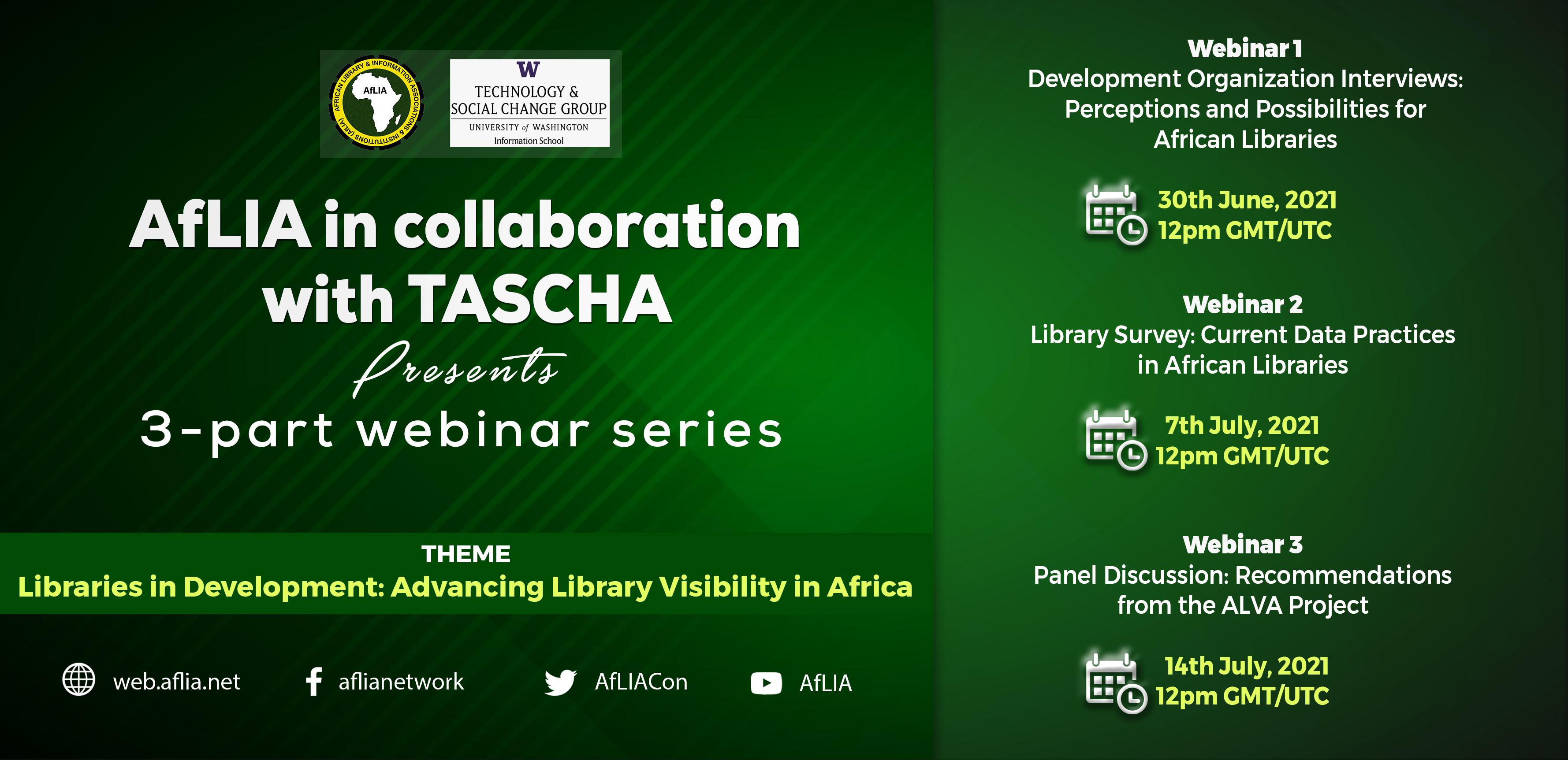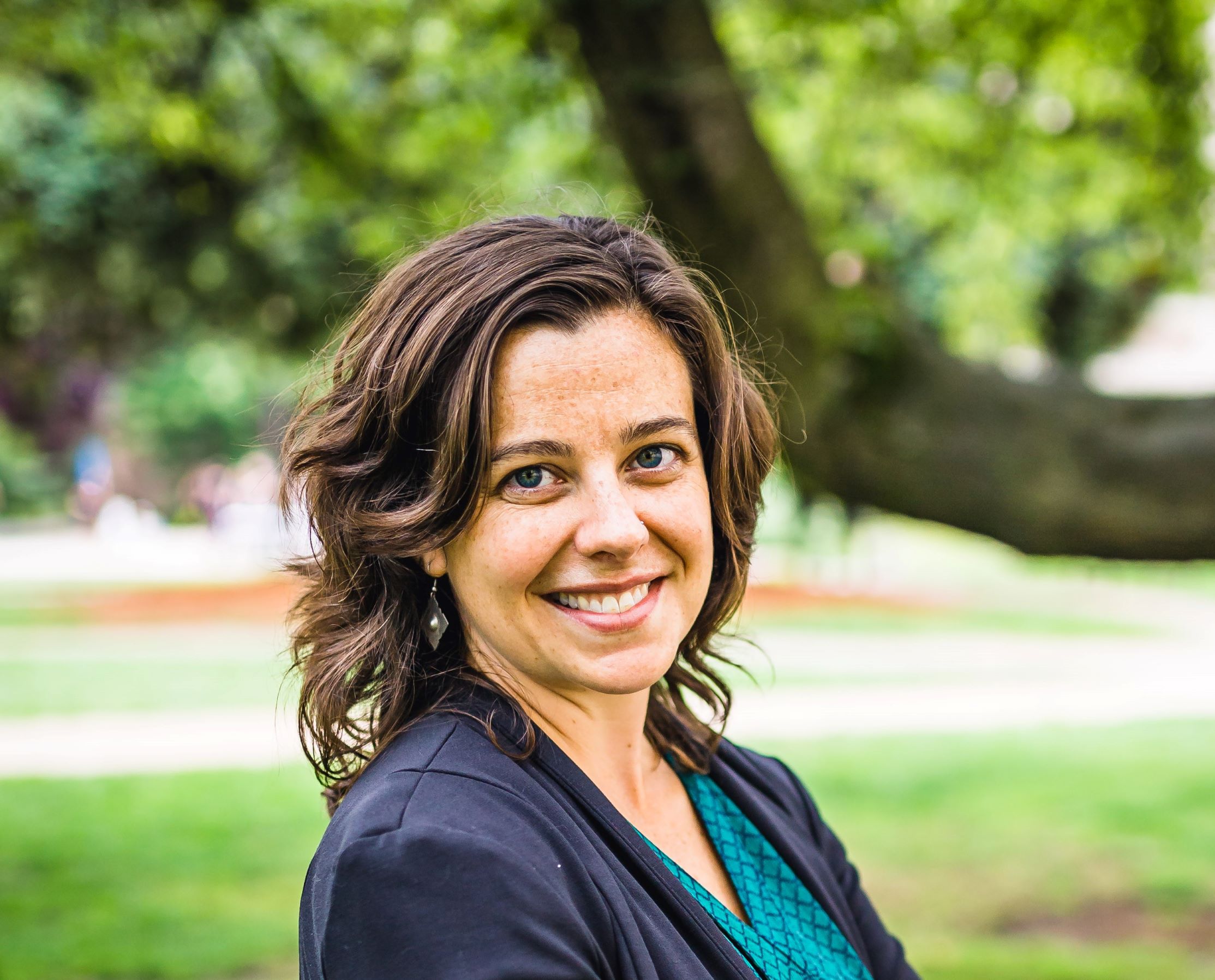Webinar Series – Libraries in Development: Advancing Library Visibility in Africa

11TH JUNE, 2021
Overview
African libraries are drivers of development in their countries, but international development organizations do not perceive libraries as potential partners. Many libraries desire more partnerships with development organizations to increase their local impacts but are unsure of how to connect. How do development organizations choose partners? What are they looking for? How can libraries shift their perceptions as potential partners? What data would be helpful, and what data do libraries currently have that could advance the visibility of libraries in development?
Over the past two years, the Advancing Library Visibility in Africa (ALVA) project has been seeking answers to these questions. Together, AfLIA and TASCHA (Technology and Social Change Group at the University of Washington Information School) have been conducting research with development organizations and African library systems to illuminate the gap in perception and suggest possibilities for connection. In a series of three webinars, they will share in-depth findings from the two phases of this research: interviews with development organizations (Webinar 1) and a survey of current data practices in African library systems (Webinar 2). They will then invite a panel of African library stakeholders (Webinar 3) to discuss the findings and recommendations.
Theme
“Libraries in Development: Advancing Library Visibility in Africa”
- Webinar 1: Development Organization Interviews: Perceptions and Possibilities for African Libraries
- Webinar 2: Library Survey: Current Data Practices in African Libraries
- Webinar 3: Panel Discussion: Recommendations from the ALVA Project
Date, Time & Learning Outcomes
| Webinar | Date and Time | Sub-theme | Expected Outcome(s) |
| 1 | 30th June, 202112pm GMT/UTC | Development Organization Interviews: Perceptions and Possibilities for African Libraries | Learn about key findings from interviews with development organizations.Understand their perceptions of African libraries and what they are looking for in partners and partnerships. Identify ways for libraries to use data effectively to market themselves to organizations. |
| 2 | 7th July, 202112pm GMT/UTC | Library Survey: Current Data Practices in African Libraries | Learn about key findings from a survey of data practices in African libraries.Understand current trends in data types, usage, and needs. Identify connections between current library data capacity and development organization partnerships. |
| 3 | 14th July, 202112pm GMT/UTC | Panel Discussion: Recommendations from the ALVA Project | Understand the project recommendations based on research.Discuss reactions and responses to the recommendations with library stakeholders. |
Target Audience
- Librarians from all library types are welcome, with a focus on public and community libraries.
- Library leaders who are interested in attracting development partnerships.
- All library stakeholders.
Registration details and link
Click on the button below to register for this webinar series. Kindly note that once you register, you will receive periodic reminders about the event. Attendees only need to register once as registering automatically enrolls you in all three webinars in the series.
About Resource Persons
For Webinars 1 and 2:

Renee Lynch is a PhD Candidate in English and Research Associate with the Technology and Social Change Group (TASCHA) at the Information School, University of Washington (UW), Seattle. Her research interests include English language education in sub-Saharan Africa, international collaboration, and decolonizing pedagogies.
She has been collaborating with AfLIA on the Advancing Library Visibility in Africa (ALVA) project since 2019. She holds a Masters in TESOL from UW and a Bachelors in Theatre and Anthropology from Grinnell College.

Dr. Jason Young is a Senior Research Scientist with the Technology & Social Change (TASCHA) Group at the University of Washington (UW) Information School. He is also a research fellow at the UW Center for an Informed Public and an affiliate faculty at the UW Jackson School of International Studies.
Young’s research interests include information and communication technologies and development (ICTD), misinformation studies, technology use in rural communities, and community-based research design. He has been collaborating with AfLIA on the Advancing Library Visibility in Africa (ALVA) project since 2017. He holds a PhD in Geography from the University of Washington.
Webinar 3:
Library Stakeholder Panelists to be announced.
Technical requirements
Upon registration, reminders will be sent to all registrants periodically. This webinar will be hosted on Zoom Conferencing Platform. Participants, who do not have Zoom on their mobile devices and or computers, need to download, install and create an account on Zoom ahead of time (CLICK TO DOWNLOAD). Webinar attendees are encouraged to join early, preferably 15 minutes to the start of the webinar, as one may need time to launch the application.
The speaker will use a webcam to connect with attendees. Audio and video for the session will be streamed over computer speakers. Attendees are therefore encouraged to connect with a headset or earpiece for maximum utility. Please note that attendees will not receive certificates of participation.
Webinar materials
Below are some useful related studies and reports you can read through ahead of the webinar.
- Data for advocacy: A survey of data practices in African library systems
- Public Libraries and Development across sub-Saharan Africa: Overcoming a Problem of Perception
- African Libraries in Development: Perceptions and Possibilities
- Research on African Libraries in Development: Perceptions and Possibilities
Other resources (including presentation slides) will made be available at the end of the webinar, to enable thorough engagement with the webinar content. All registrants will have access to the presentation slides. The webinar recording will be uploaded on AfLIA YouTube Channel soon after the webinar to facilitate continuous engagement with the webinar content by webinar attendees and non-attendees.
Queries
For further enquiries and assistance about the webinar, contact us at afliacomm@aflia.net.
